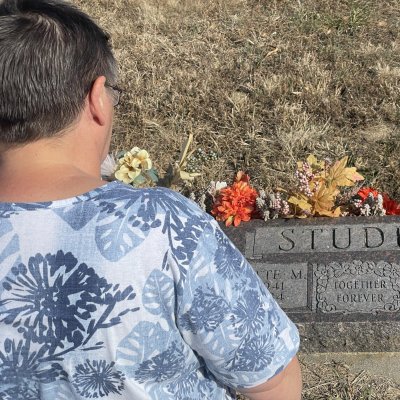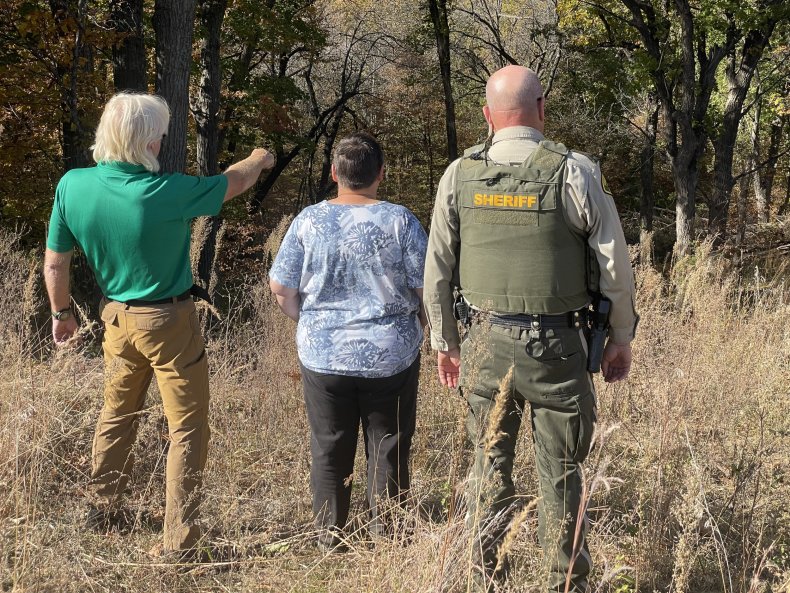The hunt for human remains near Thurman, Iowa, was called off Thursday after an "exhaustive" search for evidence of Lucy Studey's claims that her father was a killer who killed scores of people, burying their remains in the hollows around the area, yielded no evidence to corroborate her allegations, officials said.
But questions remained about how "exhaustive" the search really was, and what this news means for the overall case.
The Iowa Division of Criminal Investigation, the lead agency on the case, issued a brief statement Thursday, calling off the search. It was aided by the FBI and the Fremont County Sheriff's Department.
The full statement, issued by the DCI, read: "Over the past three days, state, local, and federal law enforcement assisted with an investigation in Fremont County. Authorities brought in an array of experts representing several disciplines and significant assets to excavate, collect and examine soil samples from a site identified by a reporting party. After exhaustive efforts, no evidence or other items of concern were recovered.
"Law enforcement agencies coordinating this effort included the Federal Bureau of Investigation, the Division of Criminal Investigation and the Fremont County Sheriff's Office.
"No further information will be released at this time."
The statement, which appeared vague, didn't make clear whether funding or harsh weather conditions played into the decision to end or suspend the probe. A law enforcement source familiar with the investigation told Newsweek later Thursday, "It's over."
It was an anticlimactic ending to an investigation that, for months, had riled up social media, brought in experts from various parts of the country and had the state medical examiner and forensic archeologists on call.
All agencies had taken seriously Studey's claims that her father, Donald Dean Studey, killed women – mostly bar patrons and prostitutes or transients he offered shelter to – and some men, dumping their bodies in a well on the land or along morel mushroom trails. Three cadaver dogs, going separately, had alerted to potential remains on the sites when they were used by law enforcement in October and November.
In addition, law enforcement sources working the case told Newsweek that Lucy Studey's story remained mostly constant and seemed credible, while Donald Studey's past – criminal and otherwise – suggested his youngest daughter's story was solid.


They did not provide details of that past, but Newsweek has found evidence through relatives, interviews with law enforcement officials and records that the father was tied at a low level to organized crime, mostly in the Omaha area. This raised the possibility that, in addition to Donald Studey allegedly killing women on the property, the land was used as a dumping ground for people killed by organized crime.
But a witness who watched the excavation efforts this week questioned how "exhaustive" the search really was. The statement says it lasted three days, but the witness told Newsweek that the investigation began early Tuesday and stretched into late Wednesday, while most of Thursday was spent clearing out the site ahead of harsh weather conditions moving into the area.
The witness also said the FBI, DCI and Fremont County Sheriff's investigators only core-drilled one well, taking three deep samples of soil to be inspected for remains, and they excavated one potential shallow grave. No other cadaver dogs were used during the investigation Tuesday and Wednesday, the witness said – despite another witness saying they were on hand.
Lucy Studey stayed at her home in Florida during the search – she had requested to be on-site to pinpoint the right well to search and the locations of the shallow graves. She was anxious during the days of the search that the wrong well was being inspected. There were at least two wells on the land, which stretches more than 400 acres between the Studey property and neighboring lands.

Of the two wells, one was a wet well in a heavily excavated area where the landscape had changed dramatically since Lucy Studey visited the site with the FBI and Fremont Sheriff's deputies in 2021 to show them the area and explain where her father allegedly dumped bodies. His four children – dating back to the 1970s — were told to pour lye and dirt atop the suspected graves, she said.
Throughout the investigation, which dates to early 2021 with Newsweek becoming aware in September, Lucy Studey said the right well to search was actually the dry well, located atop a hill on untouched landscape. That well, according to the witness, was never searched Tuesday and Wednesday, infuriating Lucy Studey.
"I now understand how my dad got away with it, and why it's been 45 years of disappointment from authorities," she said, alluding to her claims that she told teachers, school principals, priests and law enforcements over 45-plus years about her dad's alleged crimes. "I'm not giving up. I'm getting those bodies out of the ground."
She and the witness, as well as at least one official involved in the investigation, wondered why investigators at the scene didn't search all of the spots that the cadaver dogs had flagged as potential sites for bodies. Newsweek was present in October when two dogs, going separately, scented potential remains in at least nine spots. A third dog was on site in November, alerting at similar locations but showing great interest in the area of the dry well, sources who were present told Newsweek.
The FBI refused to comment and did not answer questions about the funding allocated to the search. The Fremont County Sheriff's Department did not return multiple calls and the DCI would not comment beyond Thursday's release.
The probe, lasting just two full days despite the massive area of concern and the many areas of interest indicated by the cadaver dogs, concerned experts in the field.
Some said investigators likely put a spend cap on the investigation and simply stopped when that limit was reached. Others said something about Lucy Studey's story – originally believed by investigators – may have changed or was disproven, while others suggested the probe was simply done to show authorities took some action, without setting too high a precedent for future searches when people like Lucy Studey call in such allegations.
One senior law enforcement official familiar with complex criminal investigations observed: "Cadaver dogs indicated that human remains were present at one time. Because of the potential connection to organized crime and the length of time before investigators searched, I would be concerned that the scene has not been secure. Additionally, considering the size of the property, that seems like a small portion to search."
Another expert is Mark Becker, a former senior FBI official in Northwest Indiana who oversaw violent crime and evidence collection. "I don't know why they would go through all that work (bringing in so many experts and doing the excavation) for that," he said. "I don't know. I don't."
Asked how he would have handled the search, Becker said, "I probably would have done a little bit more. There's got to be something else going on there. I mean, they've got to have interviewed someone or found something – or failed to find something. I don't know why you would just give it a two-day effort."
Lucy Studey, who was supposed to be polygraphed last Friday but was stood up, may start a grassroots effort with some relatives who support her to further investigate her allegations against her father. One of her sisters has denied the allegations to Newsweek, saying that her father was strict, but loving and caring.
"My father was not the man she makes him out to be," Susan Studey told Newsweek in October. "He was strict, but he was a protective parent who loved his children... Strict fathers don't just turn into serial killers... I'm two years older than Lucy. I think I would know if my father murdered. I would know if my dad was a serial killer. He was not, and I want my father's name restored."
Susan Studey did not immediately return calls for an updated comment Friday.
"I plan to continue the well-excavation efforts until the day I die," Lucy Studey told Newsweek Friday. "I will never give up, whether I do it with or without the authorities' help."








